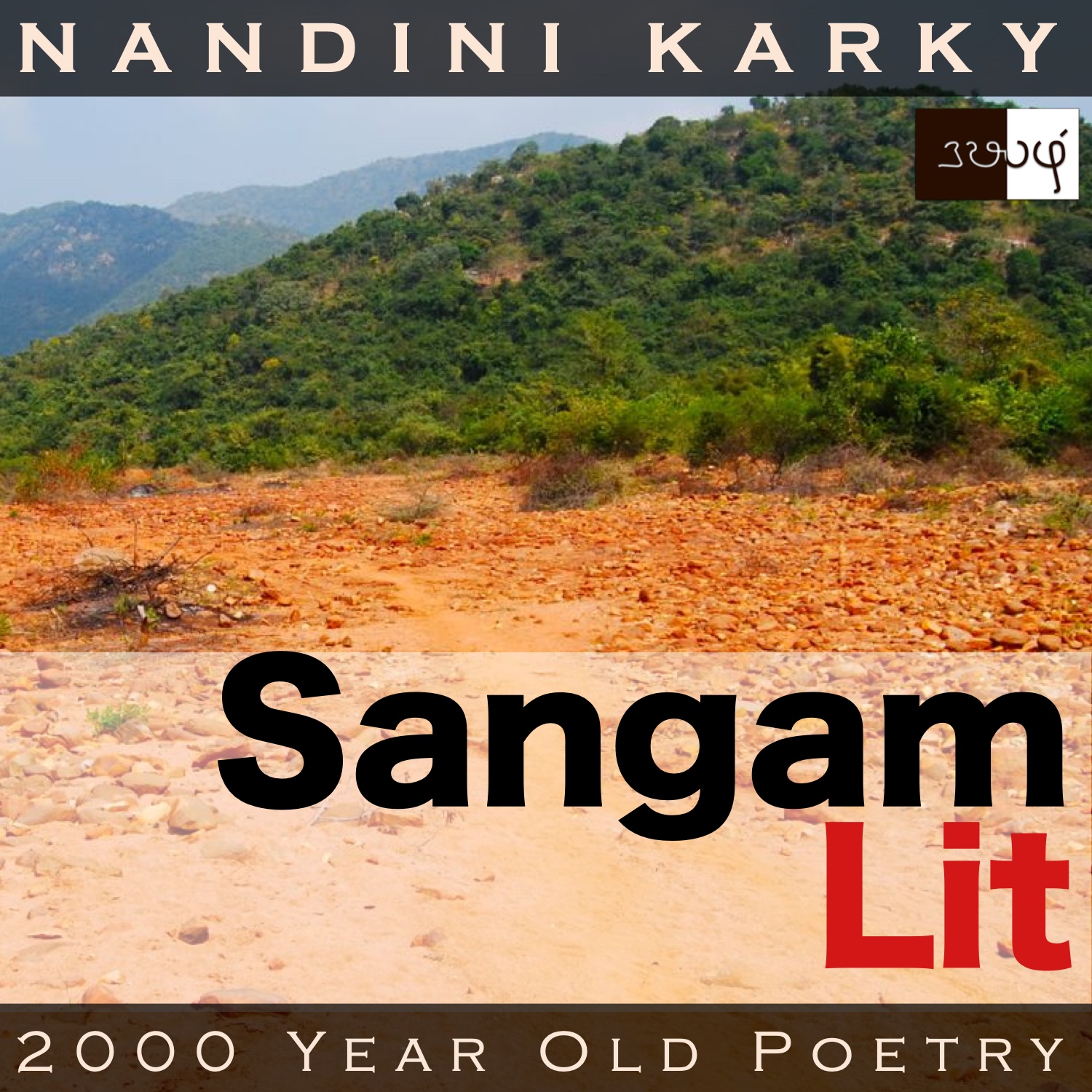Podcast: Play in new window | Download
Subscribe: Apple Podcasts | Spotify | Amazon Music | Android | iHeartRadio | Email | TuneIn | RSS | More

In this episode, we perceive the angst in a lady, propelling her on an unthinkable path, as portrayed in Sangam Literary work, Kurunthogai 11, penned by Mamoolanaar. The verse is situated in the drylands of ‘Paalai’ and speaks in the voice of the lady to her heart, as her confidante listens nearby.
கோடு ஈர் இலங்கு வளை நெகிழ, நாளும்
பாடு இல கலிழும் கண்ணொடு புலம்பி,
ஈங்கு இவண் உறைதலும் உய்குவம்; ஆங்கே
எழு, இனி-வாழி, என் நெஞ்சே!-முனாது,
குல்லைக் கண்ணி வடுகர் முனையது
வல் வேற் கட்டி நல் நாட்டு உம்பர்
மொழி பெயர் தேஎத்தர் ஆயினும்,
வழிபடல் சூழ்ந்திசின், அவருடை நாட்டே.
The scent of pining is thick in the air! Even as it opens, the verse highlights the characteristic Sangam image of ‘shining bangles slipping away’ as can be seen in ‘இலங்கு வளை நெகிழ’. In addition to this, we learn that the bangles are ‘crafted from conch shells’ as echoed by the words ‘கோடு ஈர்’. Phrases such as ‘கலிழும் கண்ணொடு’ meaning ‘with tear-filled eyes’ and ‘புலம்பி’ meaning ‘lament’ accentuate the mood of suffering. A dynamic call to action can be heard in the words ‘ஆங்கே எழு’, which means, ‘Rise, let us go’. The hunting tribe of ‘வடுகர்’ that we encountered in Natrinai 212 make an appearance here too. A historic character greets us as well, in the reference ‘வல் வேற் கட்டி’ referring to ‘Katti, skilled marksmen of spears’. An intriguing phrase ‘மொழி பெயர் தேஎத்தர்’ meaning ‘speaking in an unknown language’ informs us that the Sangam folks travelled far enough to hear different languages being spoken. Ending with the words ‘அவருடை நாட்டே’ meaning ‘his country’, the verse invites us within!
Where will this path take us? Let’s delve into the context to get a glimpse of it! The man and lady had been leading a love relationship when the man parted away to gather wealth for their wedding. At this time, the lady suffered in anguish, pining for him. One day, when her friend was nearby, she turns to her heart and says, “My glowing bangles, carved out of conch shells, slip away, and my eyelids, unable to come together, make my eyes shed tears. Escaping from living in such a state, let us go, rise up, my heart! May you live long. Behold the ‘kullai’ flowers right before us. These are worn as garlands by ‘vadugars’, and close to their region, is the good country of that valiant, strong-speared ‘Katti’. Even if my man is beyond Katti’s domain, in a faraway country , where they speak unknown languages, I have decided to go thither!” With these words, the lady expresses the torment within that seems to be taking her in an extreme direction and perhaps hopes the confidante will take some steps on her behalf!
There are layers to unravel in this little verse, which starts by zooming onto the lady’s bangles that seem to not stay in place, the first indicator of the lady losing her health and beauty. A moment to be mindful of those glowing white bangles, intricately carved out of conch shells. Speaking of which, it’s interesting how this art of making bangles from conch shells has migrated east to the city of Kolkata today, where the making of ‘Shankha’ bangles is a cottage industry. Moving on, we hear the lady remarking about her sleepless eyes that are continually shedding tears. Deciding enough is enough, she commands her heart to rise up and get moving. When we ask her where she’s off to, the lady first points to the ‘hoary basil’ flowers growing nearby and then connects that to the tribe of ‘vadugars’, who wear the same as garlands. We can recollect from Natrinai 212 that the ‘vadugars’ are a tribe, who wield harsh-sounding drums and hunt with dogs. The lady has mentioned about this tribe, only to say that close to their region is the country belonging to Katti, a feudal lord, who was said to be valiant in wielding spears. First, the lady talks of ‘Vadugars’, whom we saw were tribes living in the Vengadam hills, which are the present-day Tirupati Hills in the state of Andhra Pradesh. She also talks of ‘Katti’ and his domain close to this region. Then, she takes us farther away to the lands beyond and says even if the people there speak languages she does not understand, she has made up her mind to travel there, to follow and find her man!
The entire song seems like a cry to ‘do something… anything’! Hearing this, probably the confidante will send word to the man to hasten his return or perhaps through that expression, the lady would find some relief. What’s interesting in this verse is the reference to an unknown language! Could it refer to the ‘Telugu’ language, which too, is said to have descended from a common ancestor of South-Indian languages? Awe-inspiring to ponder on the past and how those paths led to our present!




Share your thoughts...